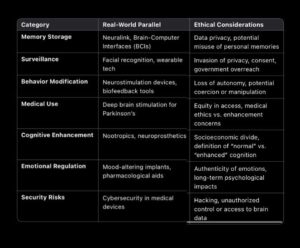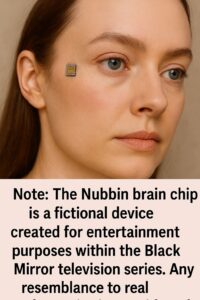what is nubbin brain chip?
In April 2025, a promotional campaign for the seventh season of the Netflix series Black Mirror featured a fictional gadget called the Nubbin brain chip, which went viral. The Nubbin chip, marketed as a ground-breaking technology created by the made-up business TCKR Systems, was supposed to let users create their own virtual worlds, curate dreams, and relive memories. The Nubbin chip does not actually exist, despite its realistic depiction and the excitement it created online.
The Fictional Technology Behind Nubbin
The Nubbin chip is portrayed in the Black Mirror universe as a tiny, implanted gadget that communicates directly with the human brain. It is said to allow users to:
• Revisit and relive past memories
• Enter dream-like experiences
• Star in classic films or travel to imaginary worlds
The device is marketed with slogans like “The perfect reality? It’s all in your head,” suggesting a curated dreamworld powered by memory recall . The promotional materials and videos showcased people using the Nubbin chip to escape reality, leading to widespread speculation and intrigue.
The Viral Marketing Campaign
Many people thought the Nubbin chip was a true technological breakthrough because of its realistic appearance. Videos and testimonies of people allegedly using the device to access their memories and dreams went viral on social media sites like Instagram and TikTok. The Nubbin chip, however, turned out to be a cunning marketing gimmick for Black Mirror Season 7.
The campaign’s popularity stemmed from its capacity to blur the boundaries between truth and fiction, which is a defining characteristic of the Black Mirror series. The show’s creators successfully engaged audiences and generated discussions on the implications of such technology by developing a believable product with a thorough narrative and genuine promotional content.
Real-World Parallels and Ethical Considerations

Despite being a work of fiction, the Nubbin chip is based on actual developments in brain-computer interfaces (BCIs). Businesses like Elon Musk’s Neural ink are creating implantable technology with the goal of enabling direct brain-to-external communication. These technologies have potential for use in treating neurological illnesses or helping paralyzed people regain their movement.
However, there are serious ethical concerns with the idea of a gadget that lets people edit their dreams or relive memories:
• Privacy Concerns: If memories can be accessed and manipulated, who controls that data?
• Consent and Autonomy: How do we ensure individuals fully understand and consent to the use of such invasive technology?
• Psychological Impact: What are the mental health implications of altering or reliving memories?
These considerations highlight the importance of ethical frameworks and regulations as BCI technologies continue to evolve.

#Here are some key points you can use to summarize the Real-World Parallels and Ethical Considerations:
1. Memory Manipulation Risks
• Technologies mimicking memory storage raise concerns about who owns and controls your personal experiences.
2. Surveillance & Consent
• Brain chips could blur lines between voluntary tracking and invasive surveillance, posing major privacy issues.
3. Autonomy & Behavior Control
• Modifying behavior through chips threatens personal freedom and opens doors to manipulation or abuse.
4. Medical vs. Enhancement Divide
• While some brain tech can treat neurological conditions, the same tools used for enhancement spark ethical debate.
5. Emotional Authenticity
• Altering mood or emotion through artificial means may question the genuineness of human experiences.
6. Digital Brain Security
• Brain chips linked to digital systems introduce hacking risks, potentially compromising one’s thoughts or behavior.
7. Access & Inequality
• As with many advanced technologies, brain chips could worsen inequality if only available to the wealthy.
Conclusion
In the Black Mirror series, the Nubbin brain chip provokes viewers to reflect on the advantages and disadvantages of cutting-edge neurotechnology. Even though it is completely fictional, its realistic depiction emphasizes how quickly technology is developing and how important it is to have ethical conversations about new developments.
As we advance toward integrating technology more intimately with the human experience, stories like that of the Nubbin chip remind us to proceed with caution, ensuring that human values and well-being remain at the forefront of innovation.
